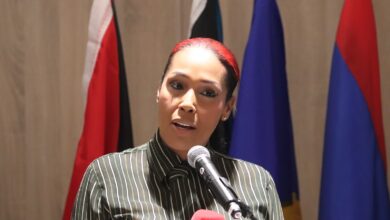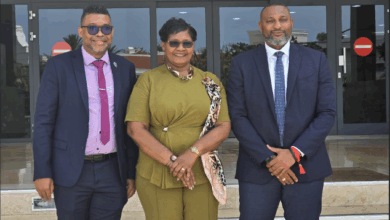(CARICOM Secretariat, Turkeyen, Greater Georgetown, Guyana) In spite of the expressed dissatisfaction with the pace of progress to achieve deeper integration, the Community must guard against divergence of opinion leading to diversion from achieving common goals, said H.E. Edwin Carrington, Secretary-General of the Caribbean Community (CARICOM).
“While acknowledging the benefits of pointing to the dangers ahead, one must distinguish between that and the harm which widespread negative speculation can cause in the public mind, especially when suggestions for better alternatives are not forthcoming,” the Secretary General said.
He added that though there were stresses, strains and perhaps even disagreements, no living family was without them.
“Divergence of opinion can be a sign of a healthy democratic environment. What we must guard against is that divergence becoming a cacophony and thereby leading to a diversion from achieving our common goals. Indeed it would do us all good never to forget the vision and courage of the Founding Fathers who gave birth to our integration process in the wake – and wake it was indeed – of our failed Federal experience,” the Secretary-General said.
He was at the time addressing the opening session of the Second Meeting between the Secretary-General and the Heads of Regional Institutions at the CARICOM Secretariat on Wednesday morning. More than 30 Community Institutions were invited to the two-day forum, the second in less than a year, aimed at ensuring more efficient and effective use of available Caribbean Community resources. The inaugural Meeting was held in Georgetown in October 2007.
Mr. Carrington referred to the continuous criticisms of and prediction by some commentators of the collapse of the integration movement and pointed to the achievements of the 35-year-old Community.
“…in addition to certain foreign commentators, some prominent regional voices and members of the media corps seem to be losing heart and are on the verge of, if not already, predicting collapse of the integration process. Some of this is due to the Economic Partnership Agreement with the European Union (EU), to which we are about to subscribe. Some is also due to the fact that we have not adopted suitable governance structures and point to the European model of governance despite the differences in geography, history and culture, and notwithstanding the fact that the experience of some who have copied the European model has been somewhat unflattering,” the Secretary-General said.
Stressing that integration was not for the “faint of heart,” the Secretary-General pointed to the beneficial work of several Community Institutions that were established by the founding Treaty of Chaguaramas in 1973, and those institutional structures that were established following the revision of the Treaty in 2001 to ensure equitable distribution of benefits of the CARICOM Single Market and Economy (CSME). Among the Institutions he singled out were the Caribbean Examinations Council (CXC), the Caribbean Disaster Emergency Response Agency (CDERA), the Caribbean Meteorological Organisation (CMO), the Caribbean Court of Justice (CCJ), the CARICOM Competition Commission and the CARICOM Development Fund (CDF).
Deeper cooperation and collaboration, he reiterated, was sorely needed now “if we are to withstand the veritable onslaught of negativism which turns a blind eye to 35 years of achievement gained by the toil”.
The forum, he said, provided an opportunity to bring a quality of “synergy to what we do in our daily tasks and importantly, to strengthen the bonds of co-operation and unity of purpose that will allow us to efficiently and effectively discharge our responsibility to our people.”





